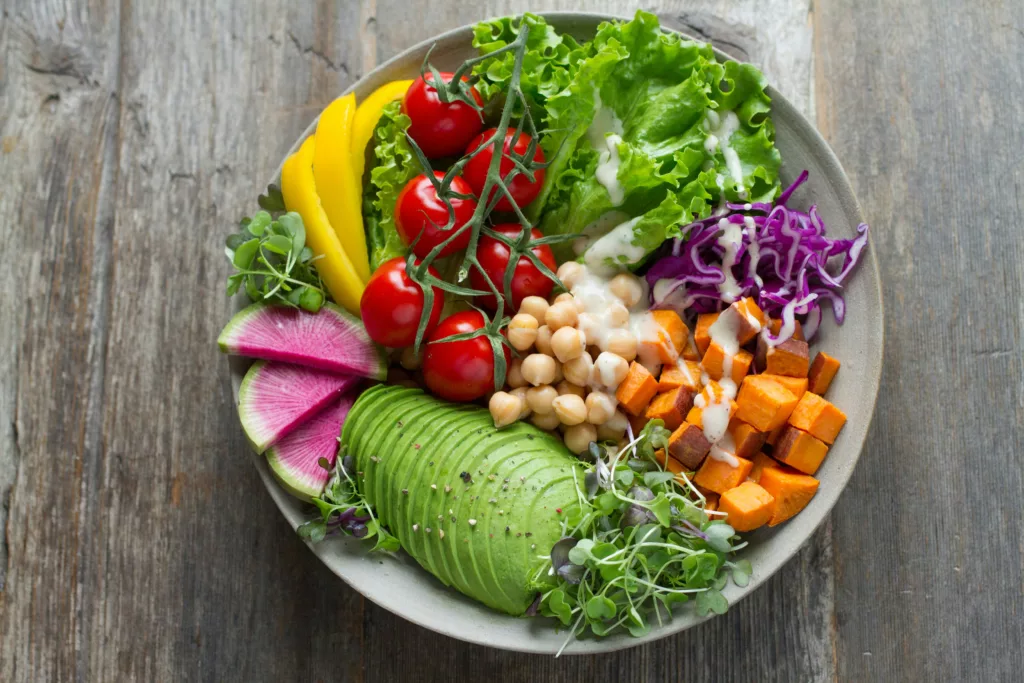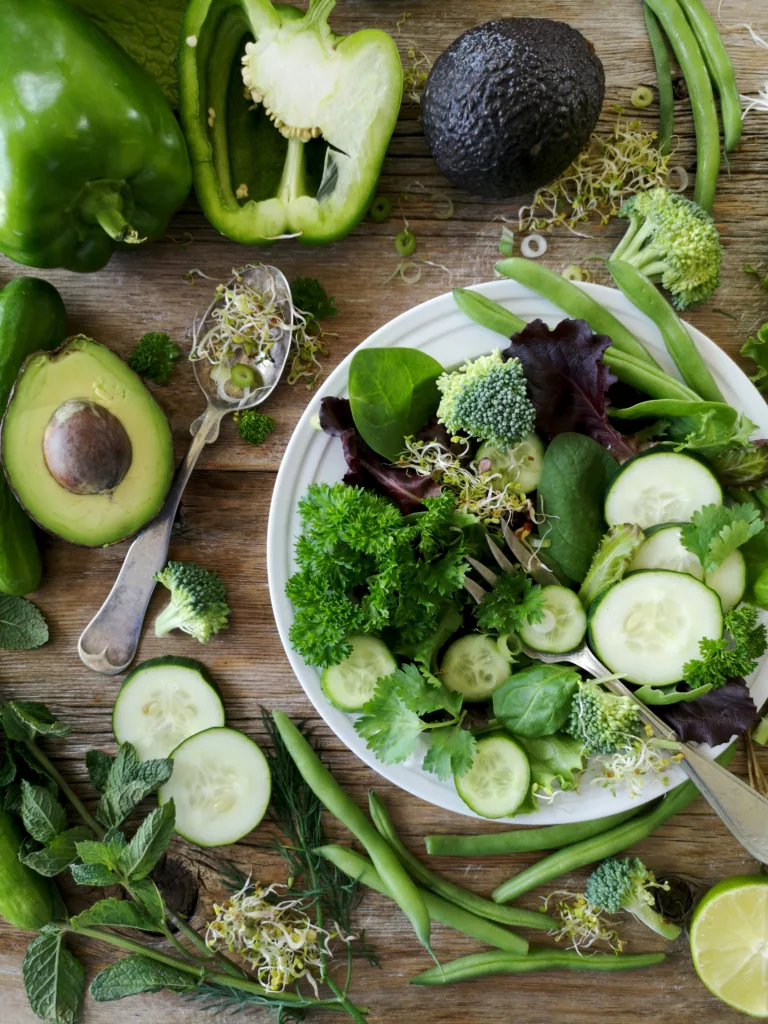What’s the best diet to follow at perimenopause?

Table of contents
I’m often asked about the best diet to follow at menopause. Nutrition has such an impact on how we feel day to day, aswell as on our long-term health and wellbeing. In this blog, I’ll explore what to consider when you’re thinking about your nutrition at menopause.
Self-compassion
Firstly, it’s really important to acknowledge that menopause is a common time for disordered eating. Our metabolism shifts, our microbiome changes, our sleep is compromised and our mood can change. These are all factors that can contribute to central weight gain, even with the same nutrition and movement, and play out in our relationship with food. Self-compassion is often really key, aswell as accessing the right support as and when we need it. Laura Clark runs a programme to support women around nutrition and weight and has a really great compassionate approach. There is more info on her website:
In terms of nutrition, for me, it’s coming back to basics. Focusing on what it’s helpful to include, rather than exclude. Getting into positive routines, and establishing these habits as the default option for the whole family, most of the time.
Supplements
Nutrition is complex, and our bodies and minds gain so much more than the individual nutrients from a meal. So for me, nutritional supplements and meal replacements aren’t something I tend to recommend. Of course, in certain circumstances, supplements are essential, such as B12 for those following a vegan diet and not regularly taking foods fortified with B12. For most, a balanced diet is far superior to a multivitamin.
Vit D supplementation 10-20 mcg per day is recommended for everyone in the UK in the Winter months (and for some people year round) as we mainly get it from sunlight.
Whole food plant based diets
Whole food plant-based diets have been shown to be associated with better symptom control at menopause and improved long-term health outcomes – a lower risk of heart disease, diabetes, cancer and low mood. The Mediterranean diet with plenty of fruit and veg, legumes like lentils and chickpeas, nuts & seeds and extra virgin olive oil can be a great place to start. Spicy foods, ultra-processed foods and caffeine can all trigger menopause symptoms in some people.

Carbs and fats
Carbs and fats both get a bad reputation but are both really important for us as at menopause. What are the right carbs and the good fats? Well, ideally complex carbohydrates (e.g. root vegetables, beans, oats, wholegrains) & fats that aren’t trans fats (e.g. nuts, seeds, avocado, extra virgin olive oil). Complex carbs regulate glucose and provide fibre. Fats support hormone production, helping symptoms aswell as being important for our long-term cardiovascular health.
Protein
Protein helps us feel full, regulates glucose which tends to trend upwards at menopause, and supports our muscles and bones. If we don’t eat meat we can still get our protein requirements, but it perhaps needs a bit more thought. Tofu, buckwheat and quinoa are complex proteins, containing all the amino acids we need. Try to aim for 20g of protein per meal if you can.
- 20g – 3 eggs or ½ block tofu or 1 pint milk or 4 tbsp cottage cheese
- 15g – 1 portion Greek yoghurt
- 8-9g – 1 handful nuts or 1 cup beans/lentils or 1 cup dairy or 2 tbsp peanut butter, 1 portion cheese
- 5-6g – 1 handful seeds or 1 serving cauliflower/broccoli/spinach or 2 tbsp houmous or 1 avocado
The gut microbiome
We’re understanding more and more about the significance of our gut microbiome every day. This virtual organ is essential for our immune system, plays a key role in regulating our hormones, affects our mood, our metabolism and weight and is being studied at the moment as being the likely reason for the different responses between individuals to prescribed medications. This is where diversity matters, it’s the key to a healthy gut microbiome – so it’s helpful to shift our mindset from 5 a day to 30 a week.
It can be helpful to think about eating the rainbow and the alphabet. Nuts, seeds, whole grains, herbs and spices all count towards the 30, and for the diversity impact it doesn’t need to be a full portion of each. I keep bags of mixed veg and mixed fruit in the freezer and have a jam jar of different nuts and seeds to sprinkle on top of meals. Some meals like a vegetable curry or bean chilli lend themselves really well to lots of veg in one go and can be batch-cooked for easy midweek meals.
Phyto-oestrogens
There’s a lot of interest in phyto-oestrogens, plant-based oestrogens. Some HRT comes from yams, so we know plants are an important source of oestrogen and progestogen. There are 3 types of phyto-oestrogens, and most of the evidence is for the first, isoflavones (edamame beans, tofu, tempeh, chickpeas, red clover supplements). There are many studies looking at the effectiveness of these food substances, and the results are variable.
Our ability to metabolise isoflavones seems to vary quite a lot, and this may be one factor in the mixed results. 30-50% of us seem to have the ability to produce equol, which is what gives us the benefits. Ethnicity and genetic variability seem to matter. Those of us who follow a largely plant-based diet seem to be more likely to be able to metabolise, maybe due to microbiome effects again as it’s a gut bacterial modification that takes place. Other phyto-oestrogens include lignans (linseed, whole grains, veg) and coumestans (sprouted seeds).
So instead of focusing on what to restrict, or on how many calories you’re taking in, perhaps it’s time for a rethink, towards what you can add to your diet that can support both how you feel today aswell as your long-term health and wellbeing.
